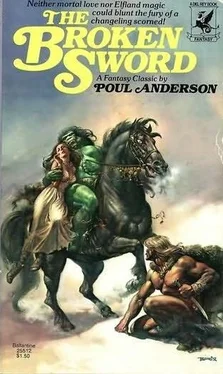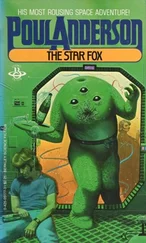Poul Anderson - The Broken Sword
Здесь есть возможность читать онлайн «Poul Anderson - The Broken Sword» весь текст электронной книги совершенно бесплатно (целиком полную версию без сокращений). В некоторых случаях можно слушать аудио, скачать через торрент в формате fb2 и присутствует краткое содержание. Жанр: Фэнтези, на английском языке. Описание произведения, (предисловие) а так же отзывы посетителей доступны на портале библиотеки ЛибКат.
- Название:The Broken Sword
- Автор:
- Жанр:
- Год:неизвестен
- ISBN:нет данных
- Рейтинг книги:3 / 5. Голосов: 1
-
Избранное:Добавить в избранное
- Отзывы:
-
Ваша оценка:
- 60
- 1
- 2
- 3
- 4
- 5
The Broken Sword: краткое содержание, описание и аннотация
Предлагаем к чтению аннотацию, описание, краткое содержание или предисловие (зависит от того, что написал сам автор книги «The Broken Sword»). Если вы не нашли необходимую информацию о книге — напишите в комментариях, мы постараемся отыскать её.
The Broken Sword — читать онлайн бесплатно полную книгу (весь текст) целиком
Ниже представлен текст книги, разбитый по страницам. Система сохранения места последней прочитанной страницы, позволяет с удобством читать онлайн бесплатно книгу «The Broken Sword», без необходимости каждый раз заново искать на чём Вы остановились. Поставьте закладку, и сможете в любой момент перейти на страницу, на которой закончили чтение.
Интервал:
Закладка:
He stood up when she did. He tried to take her hands, but she wrenched them free. His wide shoulders sagged.
“No hope?” he asked.
“None.” She started off. “I will seek a neighbour garth. It may be I can atone for what I did.” Suddenly she swung around to face him. “Come with me, Skafloc! Come, forget your heathendom, be christened and make your peace with God.”
He shook his head. “Not with that god.”
“But ... I love you, Skafloc, I love you too much to wish your soul anywhere than in Heaven.”
“If you love me,” he said mutedly, “stay with me. I will lay no hand on you save as-as a brother. But stay with me.”
“No,” she said. “Goodbye.”
She ran.
He followed. The snow crunched beneath their feet. When he passed and stopped in front of her, making her stop too, she saw that his lips were drawn back as if a knife were being turned within him.
“Will you not even kiss me farewell, Freda?” he asked.
“No.” He could barely hear her, and she looked away from him. “I dare not.”
Anew she fled. He stood watching her go. The light struck coppery sparks from her hair, the only colour in this grey and white world. She rounded a dump of trees and was lost to sight. He walked slowly the other way, out of the empty garth.
XXI
Within the next few days, that long cruel winter began to die. And one evening at sunset Gulban Glas Mac Grid stood atop a hill and on the south wind caught the first super-naturally faint breath of spring.
He leaned on his spear and gazed across the twilit snow that sloped down to the sea. An ember of sunset smouldered in the west. Darkness and stars rose out of the east, and thence too he saw a fisher boat coming. It was a plain mortal craft, bought or stolen from some Englishman, and he at the steering oar was flesh—and-blood human. Yet a strangeness brooded over him, and his sea-stained garments were of elven cut.
As he grounded his keel and sprang ashore, Gulban recognized him. The Irish Sidhe held mostly aloof from the rest of Faerie, but they had had traffic with Alfheim in past years and Gulban remembered the merry youth Skafloc who had been with Imric. But he had become lean and grim, more even than the fortunes of his people might warrant.
Skafloc walked up the hill toward the tall warrior-chief etched black against a sky of red and greenish-blue. Nearing, he saw it was Gulban Glas, one of the five guardians of Ulster, and hailed him.
The chief returned grave greetings, bending his golden-helmed head till the long black locks covered his cheekbones. He could not keep from shrinking a little away as he sensed the wickedness asleep in a wolfskin bundle on Skafloc’s back.
“I was told to await you,” he said.
Skafloc regarded him with weary surprise. “Have the Sidhe that many ears?” he asked.
“No,” said Gulban, “but they can tell when something of portent is nigh—and what could it concern this time save the war between elves and trolls? So we looked for an elf to come with strange-tidings, and I suppose you are that one.”
“Elf-yes!” Skafloc spat. The lines were deep in his face and his eyes were bloodshot; nor was his carelessness about the state of his garb usual in Alfheim, however desperate the times.
“Come,” said Gulban. “Lugh of the Long Hand must think this a great matter, for he has called all the Tuatha De Danaan to council in the cave of Cruachan, and the lords of other people of the Sidhe as well. But you are tired and hungry. First must you come to my house.”
“No,” said the man with a bluntness equally strange to elves. “This cannot wait, nor do I want more rest and food than I need to keep going. Take me to the council.”
The chieftain shrugged and turned away, his night-blue mantle swirling about him. He whistled, and two of the lovely light-footed horses of the Sidhe came galloping up. They snorted and shied from Skafloc.
“They like not your burden,” said Gulban.
“Nor do I,” answered Skafloc shortly. He caught a silky mane and swung into the saddle. “Now swiftly!”
Away they went, almost as fast as elf steeds, soaring over hills and dales, fields and forests, loughs and frozen rivers. In the dusk Skafloc saw some other of the Sidhe glimpse-wise: a flashing-mailed horseman with a spear of bright terror, a gnarly leprechaun at the door of his burrow, a strangely beak-like face on a gaunt cloak-wrapped man who had grey feathers for hair, a flitting shadow and a faint skirl of pipes in secret groves. The wintry air had a little mist in it, aglimmer above crusted snow. Night gathered softly. Stars blinked forth, bright as Freda’s eyes-No! Skafloc hauled his mind from such thoughts.
Erelong the riders were at the Cave of Cruachan. Four watchmen outside touched swords to brows in salutation. They took the curvetting horses, and Gulban led Skafloc inside.
Sea-green light filled the vast and rugged vaulting of the cave. Flashing stalactites hung from the roof, and shields on the walls gave back the clear glow of tapers. Though there was no fire, it was warm here, with a ghost of Ireland’s peatsmoke odour. Rushes had been spread. The soft rustle of them beneath his feet was all the sound Skafloc heard as he walked to the council table.
At its foot were the leaders of the people of Lupra, small and strong and roughly clad: Udan Mac Audain, king of the leprechauns, and Beg Mac Beg his tanist; Glomhar O’Glomrach, mighty of girth and muscled arm; the chiefs Conan Mac Rihid, Gaerku Mac Gaird, Mether Mac Mintan, and Esirt Mac Beg, clad in hides and raw gold. With such folk a mortal could feel at home.
But at the head of the table were the Tuatha De Danaan, the Children of the earth-mother Dana, come from Tir-nan-Og the Golden to hold council in the Cave of Cruachan. Silent and awesome they sat, beautiful and splendid to look upon, and the very air seemed full of the power that was in them. For they had been gods in Ireland ere Patrick brought the White Christ hither, and though they had had to flee the Cross, still they wielded great powers and lived in a splendour like that of old.
Lugh of the Long Hand sat in the throne at the very head, and on his right he had the warrior Angus Og and on his left the sea king Mananaan Mac Lir. Others of the Tuatha De Danaan were there, Eochy Mac Elathan the Dagda Mor, Dove Berg the Fiery, Gas Corrach, Coll the Sun, Cecht the Plow, Mac Greina the Hazel, and many more, high in fame; and with the lords were their wives and children, and harpers and warriors who followed them. Glorious it was to see that assemblage, albeit a terrible glory.
Save to Skafloc, who no longer cared about majesty or wonder or danger. He strode towards them, head held stiff, and his eyes met squarely the dark brilliance of Lugh’s while he gave greeting.
The deep voice of him of the Long Hand rolled from the stern countenance: “Be welcome, Skafloc of Alfheim, and drink with chiefs of the Sidhe.”
He signed that the man should sit in an empty seat near his own left, with none save Mananaan and his wife Fand in between. The cupbearers brought golden bowls of wine from Tir-nan-Og, and the harps of the bards rippled a luring melody as they drank.
Strong and sweet was that wine; it entered Skafloc like a flame to burn out the weariness in him. But that made the bleakness stand forth the sharper.
Angus Og, the fair-locked warrior, asked: “How goes it in Alfheim?”
“You know how badly it goes,” snapped Skafloc. “The elves fight alone and fall-even as one by one all the divided people of Faerie will fall and be swallowed by Trollheim.”
Lugh’s words came steady and implacable: “The Children of Dana have no fear of trolls. We who overcame the Fomorians, and who even when defeated by the Miletians became their gods, what have we to dread? Glad would we have been to fare in aid of Alfheim—”
Читать дальшеИнтервал:
Закладка:
Похожие книги на «The Broken Sword»
Представляем Вашему вниманию похожие книги на «The Broken Sword» списком для выбора. Мы отобрали схожую по названию и смыслу литературу в надежде предоставить читателям больше вариантов отыскать новые, интересные, ещё непрочитанные произведения.
Обсуждение, отзывы о книге «The Broken Sword» и просто собственные мнения читателей. Оставьте ваши комментарии, напишите, что Вы думаете о произведении, его смысле или главных героях. Укажите что конкретно понравилось, а что нет, и почему Вы так считаете.











